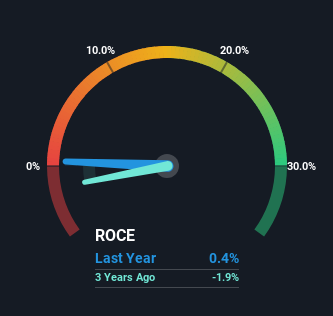- United States
- /
- Software
- /
- NasdaqGS:DDOG
We Like These Underlying Return On Capital Trends At Datadog (NASDAQ:DDOG)
Did you know there are some financial metrics that can provide clues of a potential multi-bagger? Amongst other things, we'll want to see two things; firstly, a growing return on capital employed (ROCE) and secondly, an expansion in the company's amount of capital employed. Basically this means that a company has profitable initiatives that it can continue to reinvest in, which is a trait of a compounding machine. So when we looked at Datadog (NASDAQ:DDOG) and its trend of ROCE, we really liked what we saw.
Return On Capital Employed (ROCE): What Is It?
If you haven't worked with ROCE before, it measures the 'return' (pre-tax profit) a company generates from capital employed in its business. The formula for this calculation on Datadog is:
Return on Capital Employed = Earnings Before Interest and Tax (EBIT) ÷ (Total Assets - Current Liabilities)
0.0043 = US$14m ÷ (US$4.1b - US$973m) (Based on the trailing twelve months to March 2024).
So, Datadog has an ROCE of 0.4%. In absolute terms, that's a low return and it also under-performs the Software industry average of 7.1%.
See our latest analysis for Datadog

Above you can see how the current ROCE for Datadog compares to its prior returns on capital, but there's only so much you can tell from the past. If you're interested, you can view the analysts predictions in our free analyst report for Datadog .
How Are Returns Trending?
Datadog has recently broken into profitability so their prior investments seem to be paying off. The company was generating losses five years ago, but now it's earning 0.4% which is a sight for sore eyes. Not only that, but the company is utilizing 2,894% more capital than before, but that's to be expected from a company trying to break into profitability. This can tell us that the company has plenty of reinvestment opportunities that are able to generate higher returns.
In another part of our analysis, we noticed that the company's ratio of current liabilities to total assets decreased to 23%, which broadly means the business is relying less on its suppliers or short-term creditors to fund its operations. So shareholders would be pleased that the growth in returns has mostly come from underlying business performance.
The Key Takeaway
Long story short, we're delighted to see that Datadog's reinvestment activities have paid off and the company is now profitable. And investors seem to expect more of this going forward, since the stock has rewarded shareholders with a 34% return over the last three years. So given the stock has proven it has promising trends, it's worth researching the company further to see if these trends are likely to persist.
If you'd like to know about the risks facing Datadog, we've discovered 2 warning signs that you should be aware of.
For those who like to invest in solid companies, check out this free list of companies with solid balance sheets and high returns on equity.
New: Manage All Your Stock Portfolios in One Place
We've created the ultimate portfolio companion for stock investors, and it's free.
• Connect an unlimited number of Portfolios and see your total in one currency
• Be alerted to new Warning Signs or Risks via email or mobile
• Track the Fair Value of your stocks
Have feedback on this article? Concerned about the content? Get in touch with us directly. Alternatively, email editorial-team (at) simplywallst.com.
This article by Simply Wall St is general in nature. We provide commentary based on historical data and analyst forecasts only using an unbiased methodology and our articles are not intended to be financial advice. It does not constitute a recommendation to buy or sell any stock, and does not take account of your objectives, or your financial situation. We aim to bring you long-term focused analysis driven by fundamental data. Note that our analysis may not factor in the latest price-sensitive company announcements or qualitative material. Simply Wall St has no position in any stocks mentioned.
About NasdaqGS:DDOG
Datadog
Operates an observability and security platform for cloud applications in the United States and internationally.
Excellent balance sheet with reasonable growth potential.
Similar Companies
Market Insights
Weekly Picks


Looking to be second time lucky with a game-changing new product

PlaySide Studios: Market Is Sleeping on a Potential 10M+ Unit Breakout Year, FY26 Could Be the Rerate of the Decade


Inotiv NAMs Test Center

This isn’t speculation — this is confirmation.A Schedule 13G was filed, not a 13D, meaning this is passive institutional capital, not acti
Recently Updated Narratives

Why did Novo Nordisk flop?

Xero: Growth Was Priced In — Execution Is Not

Rio Tinto (RIO): Cash Machine with a China Beta Problem — and a Copper Glow-Up
Popular Narratives


Is Ubisoft the Market’s Biggest Pricing Error? Why Forensic Value Points to €33 Per Share


Analyst Commentary Highlights Microsoft AI Momentum and Upward Valuation Amid Growth and Competitive Risks







